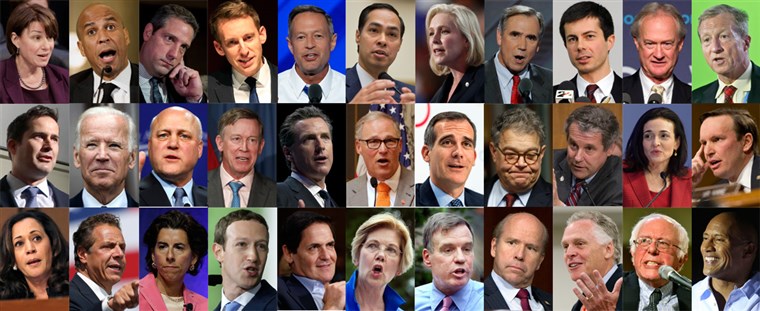2020 candidates will be tested by political extremes
March 13, 2019
As we move into March of 2019 we get closer to the looming 2020 Presidential Election. The election will no doubt be interesting, as the field of candidates in both parties will make for a riveting primary season and general election.
In the Democratic Party, the field is already large. The most well known of the bunch, are undoubtedly the senators in the field.
Senators Bernie Sanders (I-VT), Elizabeth Warren (D-MA), Kamala Harris (D-CA), Cory Booker (D-NJ), and Kirsten Gillibrand (D-NY) have all announced their candidacies for the nomination. Each of these candidates has some form of diversity the party is looking for. Warren and Gillibrand are women, Harris is an African American woman, Sanders is Jewish, and Booker, an African American, has been compared to former President Barack Obama.
Another big name is former House Representative Beto O’Rourke from Texas whose 2018 Senate campaign against Senator Ted Cruz (R-TX) gained national attention. O’Rourke lost the Senate race but won 48% of voters in a state that hasn’t voted for a Democratic president since 1976 or a Democratic Senator since 1988.
As for other Democratic candidates, former Director of Housing and Urban Development Julian Castro, on Obama nominee, has announced his candidacy in addition to the mayor of South Bend, Indiana, Pete Buttigieg, who is openly gay. There are also governors Jay Inslee of Washington and former Colorado Governor John Hickenlooper.
Currently, Sanders, the self-described democratic socialist who won 43% of the popular vote and 23 primaries and caucuses in 2016, is polling the highest among declared candidates. The only other candidate that outperforms Sanders in the polls is former Vice-President Joe Biden, however, Biden has yet to announce his candidacy.
Before Biden’s son died in the summer of 2015, Biden was considered likely to run in 2016, however, following the death of his son Beau, he decided not to run. Now though, Biden seems likely to make an announcement by the end of April about his intentions to run.
With such a large field, the race for the Democratic nomination is expected to be a long and hard fight. There will be pressure from leftist candidates to push the party in a more progressive direction with policies like Medicare for all, while simultaneously there will be pressure from centrist candidates to back away from progressive policies like the millionaire tax proposed by Warren.
Therefore, while some say the Republican Party will be the party to divide, there is a serious possibility that the Democrats will go into the convention without a unified platform and infighting reminiscent of previous conventions like 1980.
On the Republican side, President Trump will be running for a second term in office but is expected to face a centrist challenge from another candidate. Historically this has not gone well for the sitting president.
In 1980 when Democratic President Jimmy Carter was running for renomination, he faced a challenge from Senator Edward Kennedy (D-MA) and the convention that year was famously divided. Although Carter won the nomination, he went on to lose the election to Ronald Reagan. Then in 1992, Republican President George H.W. Bush faced a challenge from right-wing pundit Patrick Buchanan and the same thing happened. Bush won the nomination but lost to Bill Clinton in the general election.
So there is a lot of fear in some Republican strategists that a primary challenge could derail Trump’s chances of a second term.
However, it is early yet. We can only predict the candidates and their platforms but one thing is certain: both parties will be tested by their respective political extremes.

